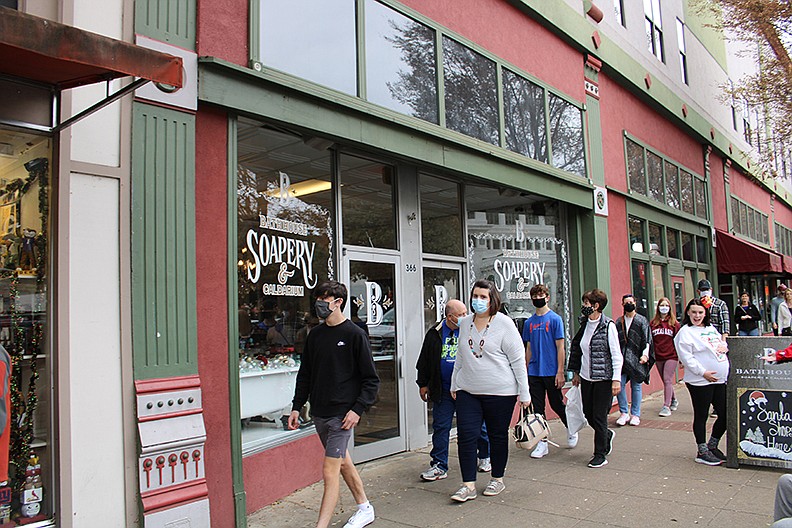ARLINGTON, Va. -- The Better Business Bureau and Facebook have launched the "Shop Safe, Shop Smart" campaign this holiday season to offer consumers actionable tips on how to spot scams and confidently shop online.
"Online purchase scams were among the top three riskiest scams for the last three years, according to our latest research," Melissa Lanning Trumpower, executive director of the BBB Institute for Marketplace Trust, the BBB's foundation, said in a news release.
"So far in 2020, online purchase scams make up more than two-thirds of the reports we receive from consumers through BBB Scam Tracker. Facebook's partnership means we will be able to reach many more consumers with important information about how to stay safe online."
"Keeping people safe on Facebook is core to our mission -- that includes creating a shopping experience everyone can feel confident to enjoy," Rob Leathern, Facebook's head of Business Integrity Product Management, said in the release.
"Working with BBB on this program will ensure this topic is top of mind for people while they are interacting with loved ones and businesses online this holiday season."
The "Shop Safe, Shop Smart" campaign will "catch consumers' attention with quirky digital ads on Facebook, Instagram, and other social media platforms. It will also call out useful tips to help people shop safely at the online retailers they already love and trust, but also to feel confident when discovering new businesses that might be turning to online channels due to the pandemic," the release said.
Through the end of December, "Shop Safe, Shop Smart" will run a new ad each week offering a different set of tips for shopping online to consumers every week. Information will cover topics such as how to spot an online scam, counterfeit products, paying safely online, and more.
In addition to the Shop Safe, Shop Smart campaign, Facebook will also become a founding member of the BBB Corporate Trust Council, a coalition of select companies joining forces with the BBB Institute to provide their expertise, resources, and funding support to build a trustworthy marketplace. The council's mandate is to work together with industry players to identify and solve specific issues affecting consumers and businesses, sharing insights via educational campaigns and programs that empower consumers to protect themselves and help businesses build trust with their customers and community, the release said.
Holiday shopping trends and tips
Consumers are predicted to spend just under $1,000 each this holiday season on friends and loved ones, much of that online, according to the National Retail Federation. The trade group said 96 percent of retailers expect to see increased online sales this year. "That tracks with what BBB is seeing: a 300-plus percent increase in consumers researching online retailers at BBB.org over the same time period last year," the release said. Other interesting online retail trends can be found in the BBB Business Impact Report, launched earlier this month.
BBB and Facebook recommend the following tips for shopping online:
• Research before buying. According to BBB's recent Online Purchase Scams Report, out of the 57 percent of those survey participants who did not research the website or business via an independent source like BBB.org before making a purchase, 81 percent lost money.
• If the deal looks too good to be true, it probably is. The top motivating factor for people who made a purchase and lost money was price, according to BBB research. Don't shop on price alone.
• Beware of fake websites: Check the URL, watch for bad grammar, research the age of the domain, search for contact information, and read online reviews.
• Professional photos do not mean it's a real offer. BBB survey respondents reported that website photos motivated them to engage with scammers, especially for pets/pet supplies, clothing/accessories, and vehicles. Be sure to check the product description and inquire for detailed information to ensure that "what you see is what you'll get."
• Make sure the website is secure. Look for the "https" in the URL (the extra s is for "secure") and a small lock icon on the address bar. Never enter payment or personal information into a website with only "http" -- it is not secure.
• Be careful purchasing sought-after products, especially during the holiday season. Be wary if a retailer claims to have loads of that trendy product that cannot be found anywhere else. Scammers often use the most popular products for the season at great prices to reel in consumers.
• Look for the BBB seal. BBB Accredited Businesses pledge to uphold the BBB Standards for Trust and to deal fairly with consumers. If a business displays a BBB seal, verify it by going to BBB.org.
• Use secure and traceable transactions and payment methods. According to BBB's research, those who paid with a credit card were less likely to lose money. Be cautious when paying by cash transfer apps, prepaid money cards, or other nontraditional payment methods.
• Shipment tracking information can be faked. Look closely to make sure the tracking information comes from a legitimate shipping company. If the information seems fishy, avoid clicking on the tracking link; go to the shipper's website and type in the code to see if it is real.
• Report unsatisfactory purchase experiences to BBB. If someone is unhappy with a purchase, they can file a complaint at BBB.org/complain. If they never receive what they paid for, they consider reporting it to BBB Scam Tracker (BBB.org/ScamTracker) to help other consumers avoid being scammed.
